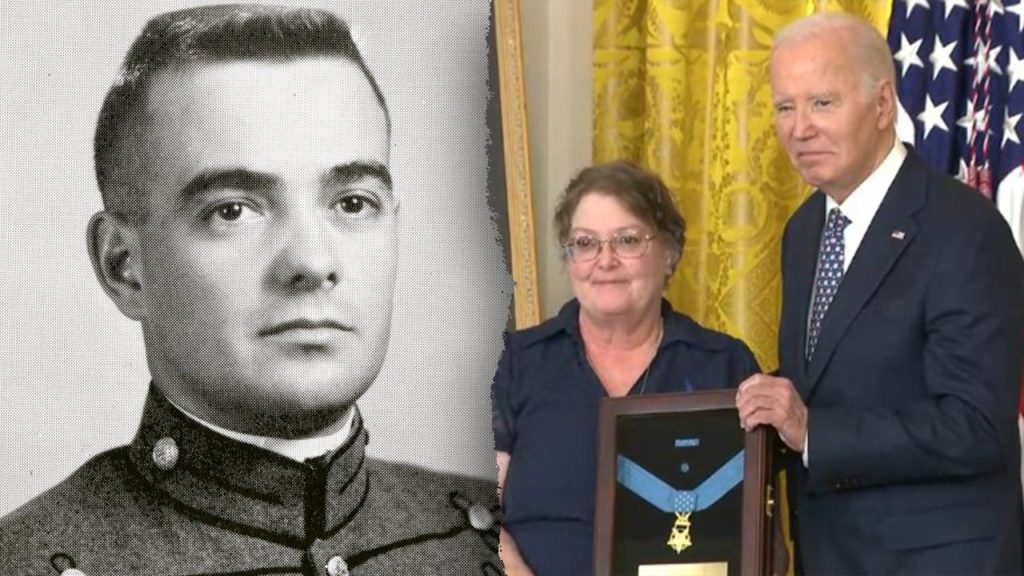In a poignant White House ceremony, President Biden bestowed the Medal of Honor, the nation’s highest military accolade, upon seven U.S. Army veterans. These individuals, spanning different ranks, generations, and conflicts, demonstrated extraordinary heroism during the Korean and Vietnam Wars. Their selfless acts of valor, often at the ultimate cost, epitomized the ideals of courage, duty, and sacrifice. President Biden emphasized the significance of these awards, highlighting the recipients’ embodiment of the nation’s best qualities. He urged the nation to perpetuate their legacy by continuing to strive for the principles they championed and, for many, gave their lives.
Five of the seven honorees made the ultimate sacrifice, including Captain Hugh Nelson Jr., the first graduate of The Citadel Military College to receive this prestigious award. Nelson’s story underscores the profound courage and selflessness demonstrated by these individuals. Serving as a helicopter pilot in Vietnam, he skillfully crash-landed his stricken aircraft amidst enemy territory. Despite his own injuries and facing intense enemy fire, he prioritized the safety of his crew, shielding them with his own body as they escaped the downed helicopter. Nelson’s actions ultimately cost him his life, but ensured the survival of his comrades. His selfless dedication saved their lives and prevented the enemy from capturing the downed aircraft.
Captain Nelson’s daughter, Debra McKnight, accepted the Medal of Honor on his behalf, a poignant reminder of the lasting impact of these acts of heroism on families. She was only five years old when her father deployed to Vietnam, and her younger brother was just six months old. Their father’s heroic death occurred just a day before his son’s first birthday, forever etching this tragedy in the family’s memory. The Medal of Honor citation eloquently captures Nelson’s extraordinary courage and self-sacrifice, underscoring his adherence to the highest traditions of military service and the honor he brought to himself, his unit, and the United States Army.
The ceremony also honored Private Bruno Orig, Private First Class Wataru Nakamura, Corporal Fred McGee, Private First Class Charles Johnson, retired General Richard Cavazos, and Specialist Fourth Class Kenneth David. Each recipient’s story reflects remarkable bravery and dedication to duty in the face of extreme adversity. These narratives serve as powerful testaments to the unwavering commitment of American soldiers throughout history. Their actions, often performed under unimaginable pressure, emphasize the enduring strength and resilience of the human spirit in the face of conflict.
Captain Nelson’s legacy resonates deeply at The Citadel, his alma mater. Tomas Fitzpatrick, the top Army ROTC Cadet at The Citadel, attended the ceremony, reflecting on the profound impact of Nelson’s sacrifice. He emphasized the values of honor, duty, and respect that Nelson embodied, serving as an inspiration for future generations of military leaders. Fitzpatrick, who plans to join the Army infantry after graduation, spoke of the aspiration among cadets to emulate Nelson’s courage and dedication. The Citadel’s Army ROTC program, a significant source of commissioned officers, recognizes Nelson’s heroic act as a benchmark for its graduates.
The Citadel President, Gen. Glenn Walters, further underscored Nelson’s exemplary character, highlighting his embodiment of courage, selflessness, and leadership – values instilled in every Citadel cadet. Nelson’s service and sacrifice serve as a powerful and enduring inspiration for the entire Citadel community. His story reinforces the enduring legacy of courage and commitment that defines the institution. The awarding of the Medal of Honor to these seven veterans serves as a potent reminder of the sacrifices made by countless individuals in defense of the nation and the enduring values they represent. Their stories inspire continued dedication to the principles of freedom and democracy for which they fought.

